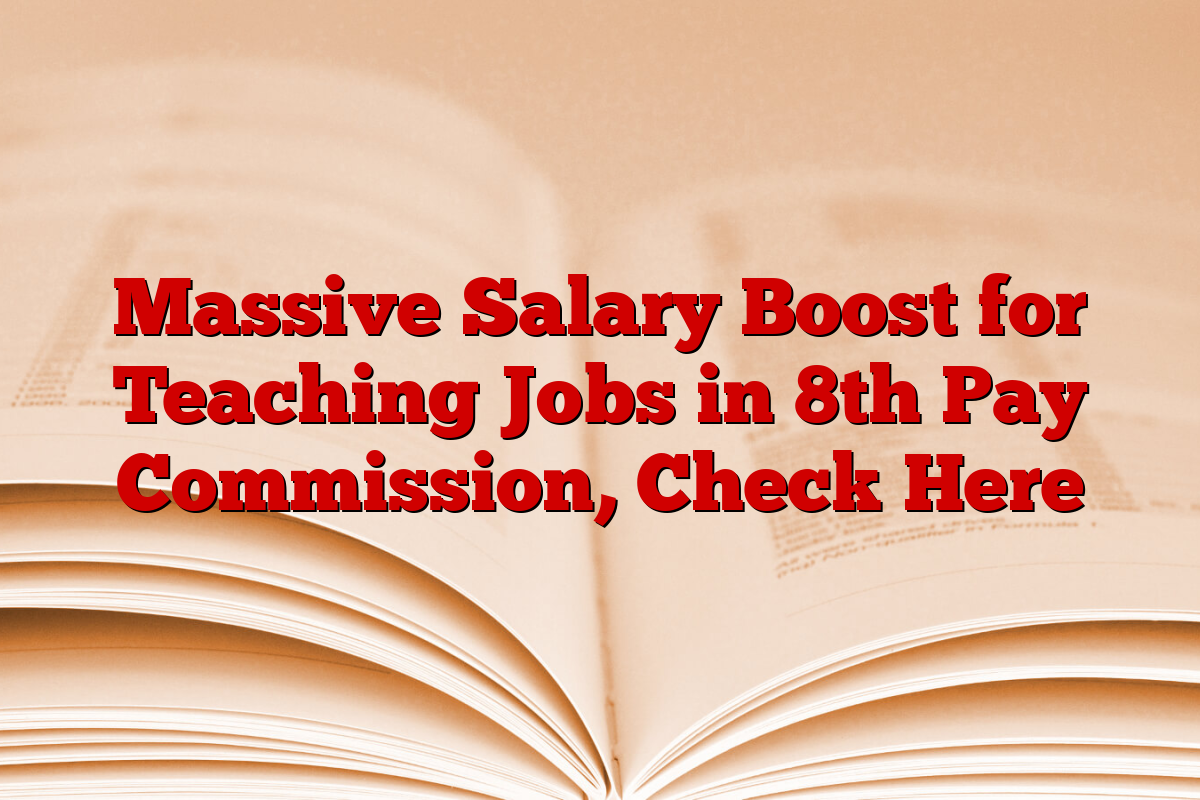The wait for the 8th Central Pay Commission (CPC) may finally end soon. Union Minister of State Jitendra Singh has assured the representatives of the employee unions that the government is actively working to establish the new Pay Commission. Discussion has started with the Pension Secretary on the possibility of restoring the old pension scheme, the long -pending demand of the employees. For millions of teachers across India, whether PRT, TGT, PGT, Assistant Professor or Lecturer, this step can give a large -scale financial boost.
Latest update on 8th Pay Commission
The government is getting ready to set up the 8th Central Pay Commission (CPC), which is expected to start from January 2026. Union Minister Jitendra Singh has assured the employees that this process will start soon. If the new rules are approved, the minimum wage of Rs. Can increase from 18,000 to Rs. 51,480, and minimum pension Rs. 9,000 to Rs. 25,740. Teachers, professors and lecturers will also get high allowances like DA, HRA and TA.
8th Pay Commission: Prominent Highlights
- There is a possibility of 8th Central Pay Commission (CPC) from January 2026
- Salary hike to benefit more than 1 crore employees and pensioners
- To see PRTS, TGTS, PGT, Assistant Professor, Lecturer, and Professors to see major pay modifications
- Fitment factor can increase from 2.57 to 2.86, almost tripling salary
- Minimum pension Rs. Can increase from 9,000 to Rs. 25,740
- There is a possibility of 3% before Diwali, by adding to profit
8th Pay Commission for teachers
For school level teachers, salary has often been an important point of concern. Under the new structure, Primary Teachers (PRT), Trained Graduate Teachers (TGT), and Post-Graduate Teachers (PGT) will look at high entry level salary and strong pension security. This will not only help in attracting young talents into the teaching profession, but will also improve retention in government schools.
8th CPC Effect on Assistant Professors and Lecturers
For the faculty of college and university, the 8th CPC will modify the pay scale at all academic levels. It includes Assistant Professor, Associate Professor and Professor. A high fitment factor means that their gross salary may be almost triple than the 7th CPC parameters. With the cost of growing and increasing responsibilities, this increase will provide very important financial stability.
Expected salary and pension hike under 8th CPC
The proposed fitment factor of 2.86 may rapidly increase salary and pension for teachers at various levels.
| Pay level | Current Salary (7th CPC) | Expected salary (8th CPC) | Current pension | Expected pension |
|---|---|---|---|---|
| Level 1 (PRT entry) | Rupee. 18,000 | Rupee. 51,480 | Rupee. 9,000 | Rupee. 25,740 |
| Level 5 (TGT) | Rupee. 29,200 | Rupee. 83,512 | Rupee. 14,600 | Rupee. 41,756 |
| Level 10 (Assistant Professor Start) | Rupee. 56,100 | Rupee. 1,60,446 | Rupee. 28,050 | Rupee. 80,223 |
| Level 13A (Professor) | Rupee. 1,31,100 | Rupee. 3,74,946 | Rupee. 65,550 | Rupee. 1,87,473 |
| Level 18 (Top Grade) | Rupee. 2,50,000 | Rupee. 7,15,000 | Rupee. 1,25,000 | Rupee. 3,57,500 |
Da Hike with 8th CPC
With the 8th CPC, reports suggest that dearness allowance (DA) can be increased to 3% before Diwali. Currently, central employees, including teachers, get 55% DA, and the increase will directly promote tech-hom pay. If both announcements are made in October, it may be a festival Bonanza for more than 1.2 million employees and retired people.
Why 8th CPC Implementation Mates for Education Area
The education sector is one of the biggest beneficiaries of every pay commission. From school teachers (PRT, TGT, PGT) to the college faculty (Assistant Professor, Lecturer and Professor), the 8th CPC will directly determine its pay scale, allowance and pension.
- High entry-level salary for school teachers makes the profession more attractive.
- Better financial security for professors and lecturers in universities.
- Better pension for retired teachers, ensuring dignity after service.
- Retention of talent in government schools and colleges, reducing changes towards private jobs.
sharing is Caring!

